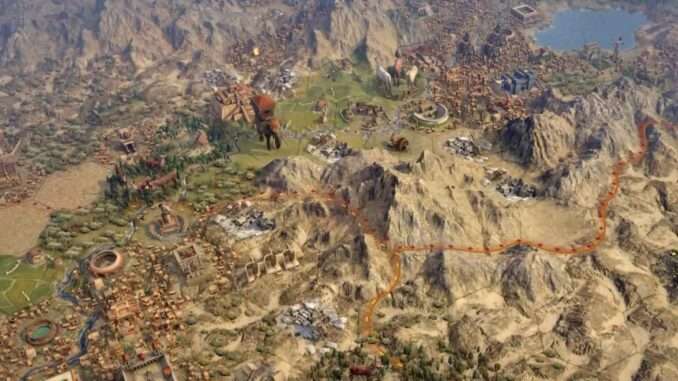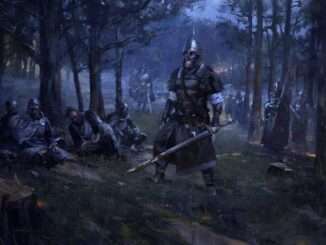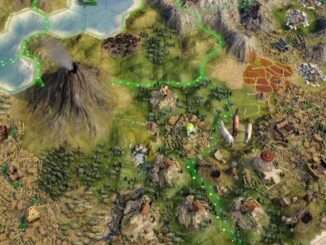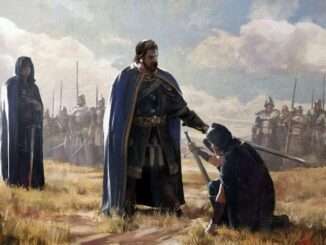
At the heart of many of the innovations in Old World is a rich and complex resource system. Because many of these resources are used in creative ways, it may not be immediately obvious what is happening. This guide is design to cut through your preconceptions and tell you how the game really works.
Note: Exact numbers are not used because many of them are scaled by difficulty.
Urban Resources
Growth
Growth values are specific to each city. When the value accumulates to a certain point, it resets and a citizen is added to the city. Building a unit with growth (ex. Settler) stops this accumulation process. If you want a city to grow, do not continually build units with growth.
Calculating Growth
- Base Value
- Bonus for being connected to Capital
- Bonus for each town within city radius
- Bonus from any certain specialist citizens (ex. Farmer)
- Bonus from ongoing Civic Projects in city (ex. Festival)
- Bonus for being connected to Fresh Water (either by river placement or by aqueduct)
- Bonus from certain improvements (ex. Pastures, Shrines to various Gods, etc)
- Bonus for having access to luxuries (Capital only)
- Family bonus if a Landowner Family owns the city
- Bonus from certain wonders (ex. Hanging Gardens)
- Bonus/penalty based on Governor
- Bonus/penalty based on your Relationship with the Family that owns the city
- Penalties for newly conquered cities that are still assimilating to your empire
- Penalty based on the level of discontent in the city
- Unique bonus for Babylon (20% bonus to entire calculation)
Culture
Culture values are specific to each city. When the value accumulates to a certain point, it resets and the city gains a cultural level. This expands the city radius and can unlock access to certain buildings, improvements, wonders, unit promotions, and more.
Calculating Culture
- There is NO Base Value
- Unique Bonus for the Greeks Only (per city)
- Bonus from certain improvements (ex. Amphitheater, Shrines to various Gods, etc)
- Bonus from any certain specialist citizens (ex. Acolyte)
- Bonus from ongoing Civic Projects in city (ex. Festival)
- Bonus from certain Laws (ex. Tolerance)
- Bonus from most Wonders
- Bonuses from events (single boost and/or bonus every turn)
- Family bonus if a Artisans Family owns the city
- Bonus from having a Major Religion present in the city
- Bonus/penalty based on your relationship with a Major Religion present in the city
- Penalties based on the level of discontent in the city
Legal Impacts
Changing the laws of your nation can have wide-reaching impacts on resource accumulation (positive or negative). Make such decisions wisely.
Civics
Civics values are generated within each city. If they are not used that turn by the city, they are added to a national pool where they can accumulate with points from other cities. You can use these points to make legal decisions, expand your state religion’s theology with a disciple, take actions with your council members (ambassador, spymaster, etc) and build city specialists (farmers, miners, etc). Word of Warning: Certain laws have Civic upkeep in order to maintain. This means that if you set too many cities to building with civics (ex. running Festivals or building walls), you can see your annual civics balance turn negative.
Calculating Civics
- Base Value
- Bonus from certain improvements (ex. Courthouses, Marble Quarries, etc)
- Bonus from any certain specialist citizens (ex. Stonecutter)
- Bonus from ongoing Civic Projects in city (ex. Forum)
- Bonus from many Wonders
- Bonuses from events (single boost and/or bonus every turn)
- Family bonus if a Statesmen, Clerics, Sages, or Patrons. Family owns the city
- Bonus/penalty based on Governor
- Penalties for newly conquered cities that are still assimilating to your empire
Training
Training values are generated within each city. If they are not used that turn by the city, they are added to a national pool where they can accumulate with points from other cities. You can use these points to promote and upgrade units, buy additional orders, march a unit beyond their normal movement rate, etc. Like Growth, building a unit with training (ex. Warrior) stops this accumulation process. Like Civics, some laws have Training Upkeep in order to sustain them. Be careful of negative balances.
Calculating Training
- Base Value
- Unique Bonus for the Greeks Only (per city)
- Bonus from certain improvements (ex. Barracks, Ranges, etc)
- Bonus from any certain specialist citizens (ex. Miner)
- Bonus from ongoing Civic Projects in city (ex. Olympics)
- Bonus from some Wonders
- Bonuses from events (single boost and/or bonus every turn)
- Family bonus if a Champions, Riders, or Hunters. Family owns the city
- Bonus/penalty based on Governor
- Penalties for newly conquered cities that are still assimilating to your empire
Urban Improvements
Certain improvements can only be built on Urban tiles OR adjacent to 2 urban tiles or improvements. If you have surrounded your original urban tiles with countryside improvements, don’t worry. You can place 2 hamlets adjacent to one another, thus satisfying the urban requirement. You can then build urban improvements adjacent to them.
Money
Money values are generated within each city (slightly modified nationally by your royal family). It is used to pay maintenance and then extra money is stored in the national treasury for use throughout the empire. Money is used for a variety of tasks: expanding your city radius (with the right laws), rushing production (with the right laws), engaging in actions with your council members, engaging in diplomatic actions with other nations, and paying for certain event outcomes.
Calculating Money
- Base Value (based on city population)
- Bonus for being connected to Capital
- Bonus from certain improvements (ex. Hamlets/Towns, Gold/Silver Mines, Markets)
- Bonus from any certain specialist citizens (ex. Shopkeeper)
- Bonus from ongoing Civic Projects in city (ex. Council)
- Bonus from some Wonders
- Bonuses / Costs Paid from events (single shift and/or shift every turn)
- Family bonus if a Statesmen or Traders Family owns the city
- Bonus/penalty based on Governor
- Bonus/penalty based on King, Queen, AND Heir (only applied once globally)
- Support costs for each courtier and each member of the royal family
- Maintenance costs based on number of citizens in the city
- Penalties for newly conquered cities that are still assimilating to your empire
- Unique bonus for Carthage (50% bonus to entire calculation)
Science
Science values are generated within each city (slightly modified nationally by your royal family). The total is applied to research each turn to discover new technologies. Technologies are incredibly important, but differences in national power due to technologies might not become evident until you have made 10-20 turns of mistakes. Don’t neglect your science!
Calculating Science
- Base Value
- Unique bonus for Carthage only (when new city founded)
- Unique bonus for Babylon only (per city)
- Bonus from certain improvements (ex. Library)
- Bonus from any certain specialist citizens (ex. Apprentice)
- Bonus from ongoing Civic Projects in city (ex. Archive)
- Bonus from some Wonders
- Bonuses provided by events (single shift)
- Family bonus if a Sages Family owns the city
- Bonus/penalty based on Governor
- Bonus/penalty based on King, Queen, AND Heir (only applied once globally)
- Bonus provided by certain courtiers
- Maintenance costs based on number of citizens in the city
- Penalties for newly conquered cities that are still assimilating to your empire
Countryside Resources
Countryside resources are produced by improvements built in the countryside and enhanced by city specialists working those tiles. These value are then used to pay upkeep for units, citizens, and improvements. Some Nations and/or Families have bonuses that will affect these resources. Extra resource units accumulate for use throughout the empire. Accumulated resources can be used to build new units (in addition to growth or training), new improvements, wonders, and to make certain events choices.
Food
Used to pay upkeep on certain improvements +
Used to build and pay upkeep on the below units:
- Slinger
- Chariot
- Conscript
- War Elephant
- Horse Archer
- Camel Archer
- Horseman
- Cataphract
Additionally: Pays upkeep on every citizen in every city in your empire.
Iron
Used to pay upkeep on certain improvements +
Used to build and pay upkeep on the below units:
- Warrior
- Maceman
- Axeman
- Swordsman
- War Elephant
- Ballista
- Crossbowman
- Pikeman
- Horseman
- Cataphract
- Bireme
- Dromon
Wood
Used to pay upkeep on certain improvements +
Used to build and pay upkeep on the below units:
- Archers
- Spearmen
- Chariot
- Catapult
- Ballista
- Onager
- Horse Archer
- Camel Archer
- Longbowman
- Crossbowman
- Pikeman
- Bireme
- Dromon
Stone
Used to pay upkeep on certain improvements +
Used to build and pay upkeep on the below units:
- Catapult
- Onager
Additionally: Required to run many Civics projects, build with Civics (ex Walls), and pay upkeep on those buildings.
Often needed in large quantities for wonders.
Royal Resources
Legitimacy
Legitimacy is raised by completing ambitions, family events (births, training, etc), building wonders, and event choices. It accumulates slowly over many years and generates a bonus to both Orders and Family Opinions. It can be spent to buy additional orders, but this is a very costly way to do so.
Luxuries
Luxuries are special resources provided by unique terrain improvements (such as Salt mines). They will automatically be used to improve growth in the Capital. However, you can also send the luxury to another nation to curry favor with them.
Orders
Order are generated by your Legitimacy rating + a bonus based on how many citizens you have in your empire + a bonus based on some improvements (ex. Pasture) + a bonus based on some city specialists (ex. Master Scribe). Assyria can also generate bonus orders by killing units.
Orders are used for many tasks:
- Moving, promoting, and upgrading units
- Adding a general to a unit
- Engaging in actions with your council members
- Engaging in diplomatic actions with other nations
- Building improvements (per turn of work)
- Cutting down trees with a Worker
- Harvesting Resources with a Worker or Scout





Be the first to comment